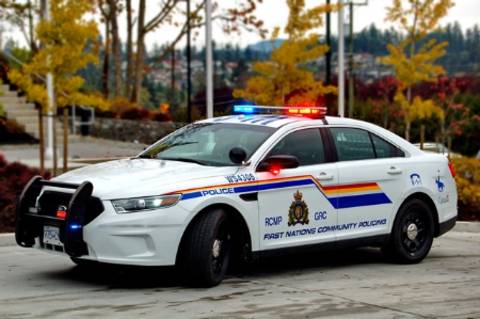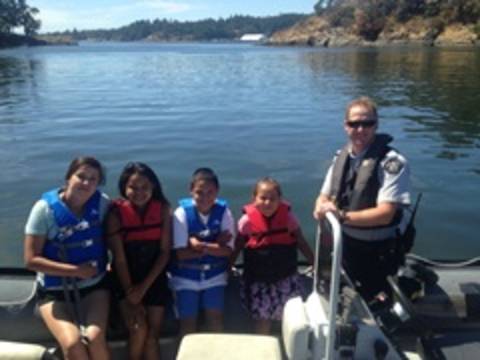Indigenous Community Policing - West Shore RCMP

RCMP vehicle with lettering First Nations Community Policing
The purpose of the Indigenous Community Policing is to lead and bring proactive, culturally sensitive policing to Indigenous people and the communities in which they live, and to improve relations between Indigenous people, the RCMP, and the Criminal Justice System through a strong and effective Indigenous policing complement.
West Shore RCMP and the Songhees Nation Language Department collaborated together to create a multi-lingual reflective back patch for the West Shore RCMP’s uniform, representing both languages.
West Shore RCMP TL’Ches Spirit Canoe Program

First Nations Community RCMP officer with children on a boat
The TL’Ches Spirit Canoe Program is run by the West Shore RCMP Indigenous Policing and Community Policing Units.
The 35-foot Pacific Dancer Canoe named TL’Ches Spirit boasts traditional Indigenous artwork and is used by the West Shore RCMP Indigenous and Community Policing Unit’s for community and cultural events.
Video:
Transcript - West Shore RCMP - West Shore RCMP TL’Ches Spirit Canoe Program
Video Description and close captioning –
Various shots of West Shore RCMP and community members paddling throughout the West Shore area on the canoe “TL’Ches Spirit”. Cst. Cole Brewer narrating in the background explaining what the program is about.
Video Transcript – Cst. Cole Brewer
My name is Constable Cole Brewer. I work in the Indigenous Policing Unit here at West Shore and serving Songhees and Esquimalt First Nations.
Providing a police service to a west coast Indigenous community. One of the ways, we’re always looking for ways to engage with youth, is utilizing the canoe to engage with youth. Our canoeing program, seemed like the perfect fit because it is really is in the blood of our youth. It doesn’t matter the weather conditions or anything like that, they are always motivated to paddle. And so getting the canoe and using it to engage with youth, at first we engaged mostly with Indigenous youth in the community. But now it’s branched out to engaging with all youth in the spirit of reconciliation.
As police, our job is so many things. It’s not just enforcement capacity. We’re also, we have to be able to connect with the community. You know, when you take away the uniform that makes it really clear when we’re out in the canoe and we’re sharing other skills and other information. And doing things in a fun manner really helps break down those barriers.
We worked really closely with some elders in the community. Specifically, one of the key elders would be Elder Joan Morris from Songhees, traditional name “Sellemah”. Elder Sellemah worked with us all the way through this. If you stand on Willows Beach and look out, you will see a series of Islands. Little Chatham, Big Chatham, and Discovery Island. Those islands are part of the Songhees reserve. And “TL’Ches” in Lekwungen means ‘island’. But it specifically refers to the former Songhees village site on Big Chatham Island. Elder Sellemah is the last Songhees member to have been born on the island.
We ensure that every time the canoe goes out, we usually share and call Elder Sellemah. Tell her where we’ve gone out, who we’ve been with. Because of the connect with the canoe and the project to the community, we also have a cultural responsibility to pass on to anybody who goes out on the canoe. And it’s just as important as the safety briefing that we give. It’s the cultural briefing. As Skippers, we’re responsible for making sure that everybody understands the name of the canoe “TL’Ches Spirit”.
The artwork on the canoe, includes the wolf on the front of the canoe. Which in Lekwungen is a “stqéyə” (Sta-Kay-Yah)”. We had the wolf out on the islands a few years ago. And a lot of community members believed that is part of the spirit of the late Chief Robert Sam. And so that is why we have a stqéyə on the canoe.
Athletics, sports, culture, being outside. When we have youth on the canoe the other thing they really have to worry about is the paddle in their hand and looking forward and staying in in sync. And it’s a really calming. You’re at peace with nature and also there’s the cultural connection to being out on the water. Which is really evident, especially when we have our Indigenous youth out there.
For us to be, to share in that, and be part of that with our community is one thing. And also when we’re engaging with the schools, sharing those teachings with and those skills with other students, it’s really empowering. And it’s a lot of fun.
It’s important that we patch on those cultural teachings. Because it connects everybody who goes on the canoe to the community and the culture of the community. Both past, present, and futures.
TL’Ches is a Lekwungen word which means “island”, specifically referring to the Chatham Islands, which is the location of a former Songhees Nation village site. Elder Joan Morris, whose traditional name is Sellemah was the last Songhees Nation member to have lived on TL’Ches (Chatham Island). Sellemah has shared many teachings with Cst. Cole Brewer who began the Canoe program several years ago.
“The tradition of passing on Indigenous teachings is what inspired us to start this canoes program. Every time we take a group of people out on TL’Ches Spirit, we provide a cultural briefing which allows the participants to understand the history and significance of the area,” said Cst. Cole Brewer, who is a member of the Lower Similkameen Indian Band and a Constable with the West Shore RCMP Indigenous Policing Unit.
Canoe training
Water safety is a top priority for our TL’Ches Spirit canoe program. Learn about the training our West Shore RCMP Community Policing officers take to become skippers and the lessons they pass on to every paddler.
Transcript - West Shore RCMP - Canoe training
Video Transcript – Cst. Cole Brewer, West Shore RCMP
We have four skippers here at West Shore and we’re all certified by Transport Canada as ‘Paddle Canada Big Canoe Leader’ which really is the safety aspect of every time we go out, we’re in charge. Our canoe is a commercial vessel and so we have to give, as if you were to go on a plane or a BC ferry, we have to give a safety precaution, safety instructions for what we do. As well, there’s just instruction, general paddling instruction.
So the West Shore, Victoria, we’re on an island. We’re surrounded by water and I think sometimes we take some of that for granted. And water safety is a huge thing. That’s one of the things we always stress. We also have to have the proper safety equipment. So we make sure everyone, regardless of their capacity and ability to swim or things like that, everybody has to wear a PFD. As well too, even a lot of things we also touch on is cold water safety because most drownings occur within 15 feet of shore. And so people have to be aware of that. And that’s usually another piece that we usually touch on as well.
West Shore RCMP
- Date modified: